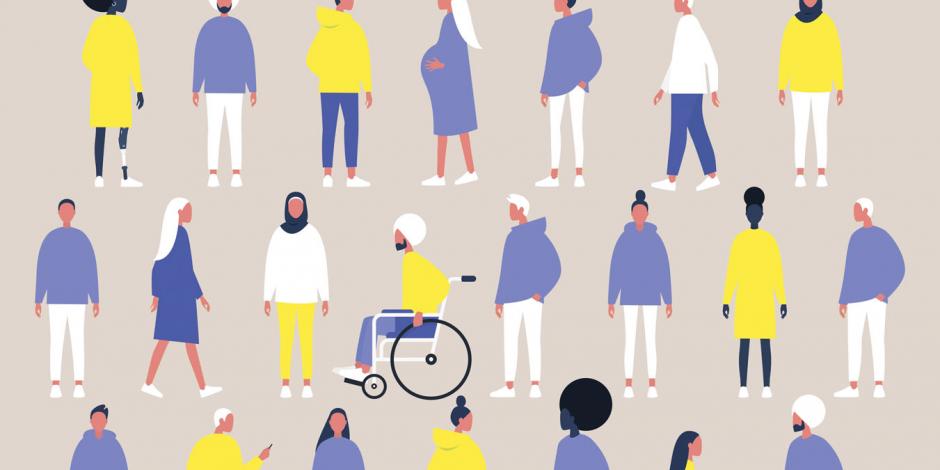Starten Sie den Audio-Text
Mit dem Audio-Player können Sie sich den Text anhören. Darunter finden Sie das Transkript.
David: Business communications expert Ken Taylor joins us in the studio now with tips on using English at work. This time, Ken has information on the language of diversity training.
Ken: Hello. This is Ken Taylor from London. The organizations we work for are becoming more diverse. We work together with colleagues from different cultural and educational backgrounds with different sexual orientations. It’s becoming increasingly important to discuss and manage these differences in order to work effectively together. Let’s practise some of the vocabulary you will need in order to do this. First, listen to this dialogue as Mark, from HR (Human Resources)PersonalabteilungHR, is talking about diversity trainingDiversitäts-Schulungdiversity training with Frances, a new employee. You can find the text in my article on page 62 of the latest issue of the magazine.
Mark: All new members of staff attend a one-day diversity training workshop.
Frances: What’s the goal of the training?
Mark: To help employees understand that it’s the differences amongst colleagues — in other words, diversity — that leads to the creation of excellent teams. It just requires a little adjustment to one’s attitudeHaltung, Einstellungattitudes.
Frances: Is it about race and gender?
Mark: Yes, it is. But it’s also about disabilities, educational differences and personality types.
Frances: I don’t think I’m prejudiced.
Mark: We can be unconsciouslyunbewusstunconsciously biased and make wrong assumptions about other people.
Frances: How does the training work?
Mark: We use case studies and experiential exercises. These help you, for example, to interpret cultural differences. They also help you to become more aware of any prejudices you may have.
Frances: It sounds interesting.
Mark: We want our staff to be tolerant of the differences they see around them and to realize that those differences help to make successful teams.
Ken: Now let’s practise some of the words Mark or Frances used in their discussion. First, I’ll give you a definition. Then you will hear two words — a and b. In the pause, choose the word that best matches the definition. Then you will hear the correct answer. Finally, you will hear a sentence from the dialogue where the word is used, followed by a pause for you to repeat it.
A small change. Is that...?
a. an adjustment
b. an adjournment
A is correct. An adjustment is a small change. Listen and repeat.
Mark: It just requires a little adjustment to one’s attitudes.
Ken: Conditions that make it difficult to do things others do.
a. disabilities
b. disfigurements
A is correct. Disabilities are conditions that make it difficult to do things others do. Listen and repeat.
Mark: But it’s also about disabilities, educational differences and personality types.
Ken: Showing an unreasonable dislike for someone or something.
a. prejudiced
b. presumed
A is correct. To be prejudiced is to show an unreasonable dislike for someone or something. Listen and repeat.
Frances: I don’t think I’m prejudiced.
Ken: Preferring or disliking someone or something, so that they are treated unfairly.
a. favoured
b. biased
B is correct. To be biased means to prefer or dislike someone or something, so that they are treated unfairly. Listen and repeat.
Mark: We can be unconsciously biased…
Ken: Things you accept as true without question or proof.
a. theories
b. assumptions
B is correct. Assumptions are things you accept as true without question or proof. Listen and repeat.
Mark: …and make wrong assumptions about other people.
Ken: Based on experience.
a. experimental
b. experiential
B is correct. Experiential means based on experience. Listen and repeat.
Mark: We use case studies and experiential exercises.
Ken: To decide what the intended meaning of something is.
a. to interpret
b. to intervene
A is correct. To interpret is to decide what the intended meaning of something is. Listen and repeat.
Mark: These help you, for example, to interpret cultural differences.
Ken: How did you get on? Learn any words you did not know. These words will be of great help when discussing diversity in your organization.
Neugierig auf mehr?
Dann nutzen Sie die Möglichkeit und stellen Sie sich Ihr optimales Abo ganz nach Ihren Wünschen zusammen.



